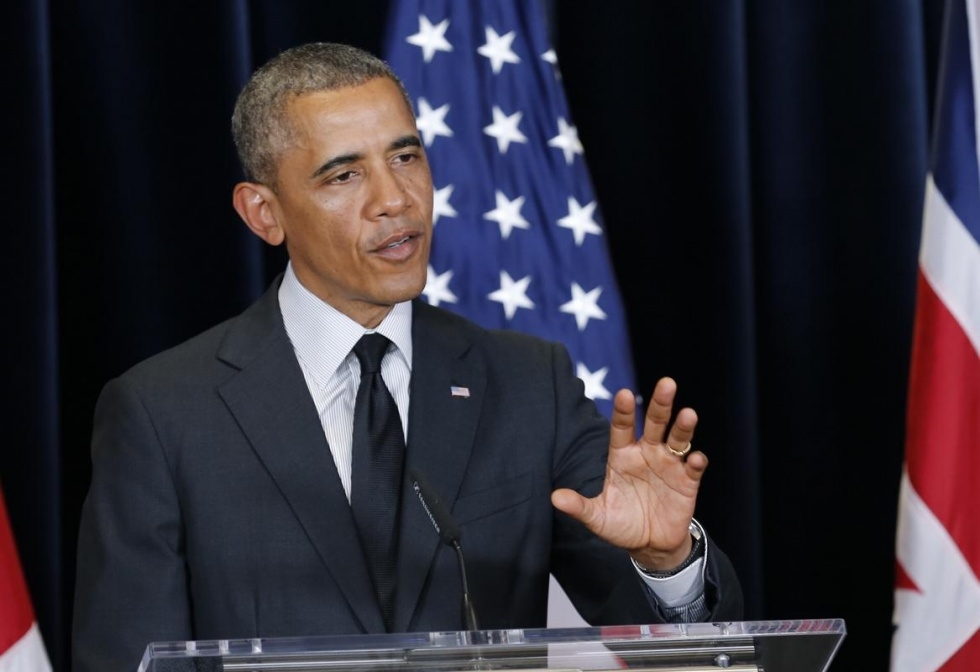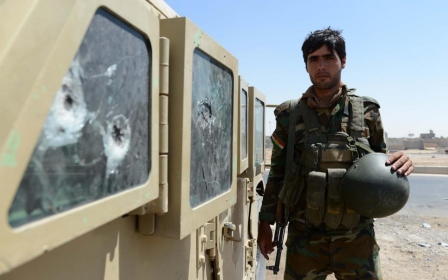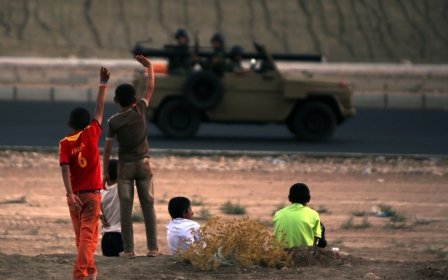Obama glimpses legacy in Iraq

US Senator John McCain showed off his knowledge of medical jargon in his last statement on Iraq in which he said that Iraq was “metastasizing”.
In case you weren't aware of the term, metastasizing, is medical jargon for the rapid evolution of a small tumour to a more dangerous malignant form.
This kind of language is rarely heard in American politics, especially in statements designed for the mainstream media. But McCain came out and said it loud and proud to a reporter as he tried to lambast Obama’s foreign policy.
“That’s not a strategy. That’s not a policy,” McCain said. “That is simply a very narrow and focused approach to a problem which is metastasizing as we speak.”
McCain, as usual, was calling for wider and more “robust” intervention. In particular, he was criticising Obama for doing too little, too late to stem the Islamic State advances in Syria and Iraq.
Yet the situation on the Sinjar mountains, while extremely dangerous at first, was quietly improving even before Obama announced air strikes.
White House press briefings about the strikes, omitted that 20,000 Yazidis had already been evacuated by Peshmergas.
The numbers fed to the UK press, also fluctuated wildly and without explanation. The Daily Telegraph a few days ago claimed that the number could be 150,000. Considering that the latest US recognisance has said there are “far fewer” than first thought -and the latest estimates say there are no more than 5,000 Yazidis in the mountains - might this misinformation have been some foreign office official trying to push the number higher? And if so, with what aim?
Again, I want to stress that the threat was initially serious, extremely serious, but intervention in Iraq is much less about humanitarian concerns than is being presented.
Tellingly, the target hit by American jets in the first two days were primarily around Erbil, not Sinjar. Already, the US has announced that it will be ceasing humanitarian drops, but will continue its air strikes.
When it comes to intervening to help the Kurds, the administration also hasn’t lied about their humanitarian motives, but they have been very selective about what information they present in their briefings.
Initially, the intervention was justified in order to protect American civilians stranded in Erbil. However, by the time the strikes began the civilians had long been evacuated.
While the Kurds are certainly under-equipped and facing a well-armed enemy, they are not nearly as vulnerable as the unarmed American citizens of indeed the Yazidis still trapped on the mountain.
Moreover, intervening just to protect the Kurds and the Yazidis raises important questions about how seriously Obama takes western intervention on humanitarian grounds, given the plethora of abuses committed elsewhere in the region. The situation in Aleppo was today described as “ethnic cleansing” yet Obama has remained steadfast.
The reality is that by seizing on this one issue, Obama is trying to neutralise pressure from the right-wing of the Republican Party to do more to save Christians stuck in Syria.
American journalist Max Fisher, has written widely this week about a background briefing he received from the White House, which he interpreted as saying that Obama had drawn an unofficial red line around Kurdistan, effectively leaving the rest of northern Iraq and eastern Syria to be ravaged by Islamic State (IS). In short, the minorities in those areas will not be receiving any American support.
Obama may also feel he has some making up to do with the Kurds, as he has long risked alienating them over initial American support from Maliki. Local Peshmerga commanders today reportedly describing the threat from Maliki as the worst they have faced, worse even than Saddam Hussein and the current situation with the Islamic State.
Now American bombers still appear to be engaging targets mainly around Erbil, with limited support for Sinjar, and Obama is paving the way for a wider intervention, warning Americans that “we are in this for the long haul.” His wording is ambiguous, perhaps deliberately.
It isn’t clear at this stage whether he is talking about a long haul intervention to protect the Yazidis (who have largely been evacuated) or a long haul operation to protect American citizens (who have already been evacuated) or a long haul to protect the Kurds and the wider interests of the US in Iraq.
But whatever the outcome, it is likely that Kurdistan will continue to enjoy ongoing US support. It is America’s last remaining foothold in Iraq – a rare province where American forces are still popular.
Somewhat secured by mountainous surroundings, the US embassy and numerous American NGOs are based there. Just as there was in 2003, there is still a strategic imperative for the US to maintain some sort of control over Iraq’s oil resources. Kurdistan will welcome US support, both military and political, and will hope that the US message of support will strengthen their case for independence
In terms of a longer or broader intervention, Obama has already been given an effective go ahead at home. The American right-wing are clamouring for war. If he can appear strong with regards supporting Kurdistan, he will no doubt score political points at home - making back lost ground over what the right-wing and many voters perceived as a hasty withdrawal of US troops from Iraq proper.
I'm no believer in conspiracy theories, but I do believe that timely events have at times been taken advantage of in the past to give American forces a pretext to invade countries, and in particular, Iraq.
Few deny that 9/11 was one such opportunity. Widely circulated plans by neo-con hawks shortly before the attacks, prove that invading Iraq was already of strategic interest to America. At the time, Rumsfeld himself was dreaming of another American-friendly democracy in the Middle East, and how an American-controlled Iraq could transform the region, as well as the bonus of unlocking cheap oil.
It is clear that Obama is willing to talk the talk of humanitarian intervention, but will no doubt be maintaining and expanding American military operations in northern Iraq long after the humanitarian crisis has subsided. All signs point to a lengthy engagement.
Alastair Sloan focuses on injustice and oppression in the west, Russia and the Middle East. He contributes regularly to The Guardian, Al Jazeera and Middle East Eye. Follow Alastair's work at www.unequalmeasures.com
The views expressed in this article belong to the author and do not necessarily reflect the editorial policy of Middle East Eye.
Photo credit: US President Obama speaks on Iraq (AFP)
New MEE newsletter: Jerusalem Dispatch
Sign up to get the latest insights and analysis on Israel-Palestine, alongside Turkey Unpacked and other MEE newsletters
Middle East Eye delivers independent and unrivalled coverage and analysis of the Middle East, North Africa and beyond. To learn more about republishing this content and the associated fees, please fill out this form. More about MEE can be found here.




